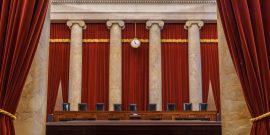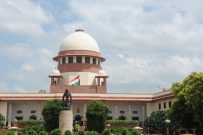As we consider Justice Kennedy's successor, we should ask what a conservative judge should believe about the role of the courts.
A Wynne For “Judicial Fraud”
Huzzah: the Supreme Court has finally decided Comptroller v. Wynne, the second-oldest case on its docket. Huzzah again: by a 5-4 majority, the justices managed to get it right. States can tax income earned by residents in interstate commerce; but can they tax it twice, consistent with the dormant Commerce Clause doctrine?
Nope, says Wynne. That conclusion, unexceptional and well-nigh dictated by precedent, commanded a narrow and very funky majority. Justice Alito—for my money, the only justice who has consistently kept a clear head and a lawyerly mind amidst the ideological, tactical, and increasingly abstruse “interpretive” struggles that swirl around the Court—wrote a forceful, confident opinion for the Court, joined by the Chief and by Justices Breyer, Kennedy, and Sotomayor.
Justice Scalia submitted a dissent, saying that the dormant Commerce Clause doctrine in its entirety is a “judicial fraud.” Justice Thomas submitted a separate dissent, which reiterates his undying opposition to the made-up doctrine and says that the Founders had no trouble with double income taxation and QED. Justice Ginsburg wrote a third, principal dissent, saying that states can tax residents to the ends of the earth and as often as they wish, so long as they provide some public service in return. The dissenters variously joined various pieces of those opinions. Small wonder this took so long.
I’ve blogged about the case before and written about it in a more formal setting. A quick read of the opinions yields two observations:
- The majority opinion embraces, without hesitation, economic analysis (supplied in two very important amicus briefs) as a perfectly legitimate element of the constitutional inquiry. It says that for constitutional purposes (1) you have to examine the state’s tax system as a whole (here, in-bound as well as out-bound taxes); and (2) it doesn’t matter what anyone calls the tax—whether it’s a “tax” rather than a “tariff” in name: if it operates like a prohibited tariff, it’s out. The analysis was urged in splendid amicus briefs by economists (including my former AEI colleague Alan Viard.) Having commended those briefs on earlier occasions, it’s great to see them play so central a role: they may very well have swung this case. The lesson won‘t be lost on future litigants.
- The majority opinion gives the back of the hand to the “originalist” arguments urged in dissent, for the umpteenth time in as many cases, by Justice Scalia and Justice Thomas. If y’all want to take issue with John Marshall and Gibbons v. Ogden (1824) and hundreds of dormant Commerce Clause cases since, the majority opinion says, be our guest. The opinion makes equally short process of Justice Thomas’s disquisition on commuter taxes anno 1789 or so. The rejection of “originalist” orthodoxy isn’t news: the Scalia/Thomas position on the dormant Commerce Clause has never carried a majority. Here, though, was a case where that position might have been decisive; and it was rejected—as far as I can see, for the first time—in a majority opinion written by a justice who is himself an unabashed originalist. That is news, and it’s good.
Two further, more speculative observations, not nearly so cheerful:
- The dormant Commerce Clause is one of only two potentially effective defenses against increasing state overreach. (The other is federal preemption, where the law is a mess and the body that’s supposed to do the preempting, Congress, is AWOL.) If ever there was a time to give the dormant Commerce Clause a workout, it’s now; but that’s not in the cards. Given Justice Scalia’s and Justice Thomas’s implacable opposition, litigants have to corral five votes out of seven; and only two (Alito and Kennedy) are tolerably safe. So the cases are hard to get cert-ed; harder to win; and easily mucked up. The operative strategy for states is to see what they can get away with and for appellate courts, to let them have their way. So it comes that California regulates energy production from Kansas to Iowa and from Canada to Brazil: the Supreme Court can’t be bothered. (And speaking of California: Alameda County is forcing pharmaceutical firms from across the globe to operate collection stations for unused medications, lest people flush them down the drain and make the local fish feel woozy. The dormant Commerce Clause, anyone? The cert petition is pending.) The narrow majority in Wynne spells continued trouble ahead, but we’ll see.
- It will be said that Justice Alito’s opinion doesn’t really answer Justice Scalia’s and Justice Thomas’s foundational objections to the dormant Commerce Clause. It doesn’t, and it shouldn’t. Certainly, there are respectable originalists reasons to support the dissenters’ position. But if we have to go back to first principles over a doctrine that’s been applied by every justice on the Court for well over a century and a half in 500-plus cases, we’re in for very long opinions and a lot of instability. Still, I suspect that “originalist” agitation against the dormant Commerce Clause is bound to intensify in years ahead. The reasons have nothing to do with the doctrine’s pedigree (which is a whole lot better than many other things originalists have come to embrace); they have to do with originalism’s sociology. No theory of constitutional interpretation can afford to embrace a socially unacceptable result—say, sex discrimination. (Originalist theory has long been reformulated accordingly.) Over the next two or three years, originalists need a theory to embrace—comfortably, and as a matter of conviction—gay marriage: it’s either that, or an intellectual ghetto. At that point, you wonder why anyone still bothers with “interpretation”—put differently, why and how “originalism” has any kind of normative force. To demonstrate that and how it still does, originalists need some issue on which their theoretical commitments have bite without rendering originalism unfit for polite society. If the result is crazy, all the better: that just shows how principled originalists are. Behold the dormant Commerce Clause doctrine: if it didn’t exist, originalists would have to invent it.
Wynne suggests that we may be one “originalist” appointment away from disaster. All in good time, though. For now, let’s celebrate.

